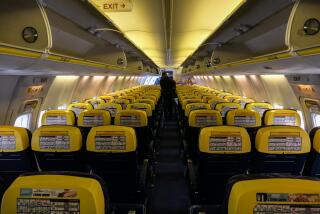A solidly grounded vision of heaven on Earth--from which we’re in full flight
- Share via
We have been discussing which modern invention we could least do without.
My choice was eyeglasses; other choices have been as varied as the automobile, indoor plumbing, the electric guitar and the down sleeping bag.
Hudson Fields of El Toro looks at the question from the other end and wonders what invention we could best have done without.
He points out that not all our inventions work out. “I can remember, at the end of World War II, that DDT was regarded as being the ultimate answer to all the world’s problems. . . . Now it seems to confirm the saying that ‘Hell is getting what one wants.’ ”
He excludes the atom bomb because it is too obvious, and because he thinks it possible that, hanging over our heads as it does, it may have deterred World War III and will continue to deter it.
I am not too happy with a peace that exists only because the alternative is annihilation, but Fields is right to dismiss the atom bomb from the game.
To eliminate any invention, we have to roll back history beyond the point of its invention; and to eliminate the atom bomb, we have to eliminate the bomb that ended World War II. Do we want to undo that one, and lose 500,000 men on the beaches of Kyushu? Let’s don’t think about it.
Fields’ candidate is the airplane, and by that he means any kind of aerial vehicle, including guided missiles.
“The world would again become larger,” he says, “with more ‘distance’ or elbow room between nations. Transcontinental and international travel would be at a slower pace, reducing all the scurrying and hurrying from one place to another. Railroad travel would now be more than an item mostly for nostalgia. Automotive travel would have been enhanced, encouraging us really to see the beauties of the nation. And without aerial delivery, the atomic weapon problem would have been reduced almost to size. . . . “
Yes, it was in many ways a lovelier world before we learned to fly. It was the world painted with such ecstatic beauty by the French Impressionists. It was a world whose separate parts lay virtually undiscovered to one another. It was open only to the rich and unemployed. Its beaches and monuments were uncrowded, its countrysides serene.
One traveled from country to country by sea, or on such elegant trains as the Orient Express, or the Baltimore & Ohio. In Rome, one might encounter only half a dozen of one’s countrymen on the Via Veneto. One might stand before the Pyramids with only one’s camel and one’s camel driver.
I remember going to Athens before jet travel. I walked up the steps of the Acropolis and found myself in front of the Parthenon with no one else in sight but one colleague and a few stonecutters chipping away at marble blocks.
It was as if the Parthenon had waited 25 centuries just for me.
But I would probably not have been there except for flight. I had flown from Los Angeles to Washington on a propeller-driven airliner, then to Newport, Va., then to Greenland (or was it Iceland?), then to the Canary Islands, then to Naples, and then to the carrier Franklin D. Roosevelt, somewhere in the Mediterranean, which took me to Piraeus, the port of Athens.
That was an arduous trip, and beyond the financial means of most people. Thanks to jet airplanes, tourists today can fly directly to Athens, where they will meet thousands of other tourists swarming in the streets and crowding through the Propylaea--the famous gates to the Acropolis.
How the world would slow down if we could turn the clock back beyond the guided missile, back beyond the jet, back beyond the multiple-engine monoplane, back beyond Lindbergh, back beyond the biplanes of World War I, back beyond Orville and Wilbur and their contemporary tinkerers, back to the steam-driven locomotive pulling its train of sleepers and chair cars and diners across the lonely continent, whistling in the night.
To go to Europe one would still have to spend four or five days on the stormy Atlantic--walking the deck for fresh air, dining in luxury, bumping elbows with the elite of two continents, and always expecting the chance encounter that would lead to romance and adventure.
What chance of adventure does one have strapped into an airplane seat--except the adventure of a hijacking?
As Fields says, “Such speculation alters nothing.”
Quantum physicists say that time is reversible; in the cosmos there is no difference between the future and the past.
That may be so; but if the test of a scientific theory is proof by demonstration, I’d like to see them stuff the airplane back in time’s bottle, and the atom bomb, too, since they invented it.
But of course we wouldn’t stuff the airplane back, for all the discomfort it has caused us. It has made the world smaller, indeed, and more dangerous; but it has made Marco Polos of us all.
Among those thousands who crowd the Acropolis are schoolteachers and housewives and auto workers and clerks and computer programmers who would never have left their homes in Toledo or Albuquerque or San Jose if the jet airplane hadn’t come along.
They have as much a right to see the Parthenon as I have, and as much right to see Rome as Shelley had.
But waiting around in airports is a high price to pay for such an experience.
As Fields says, “Hell is getting what one wants.”
All aboard, everyone.






